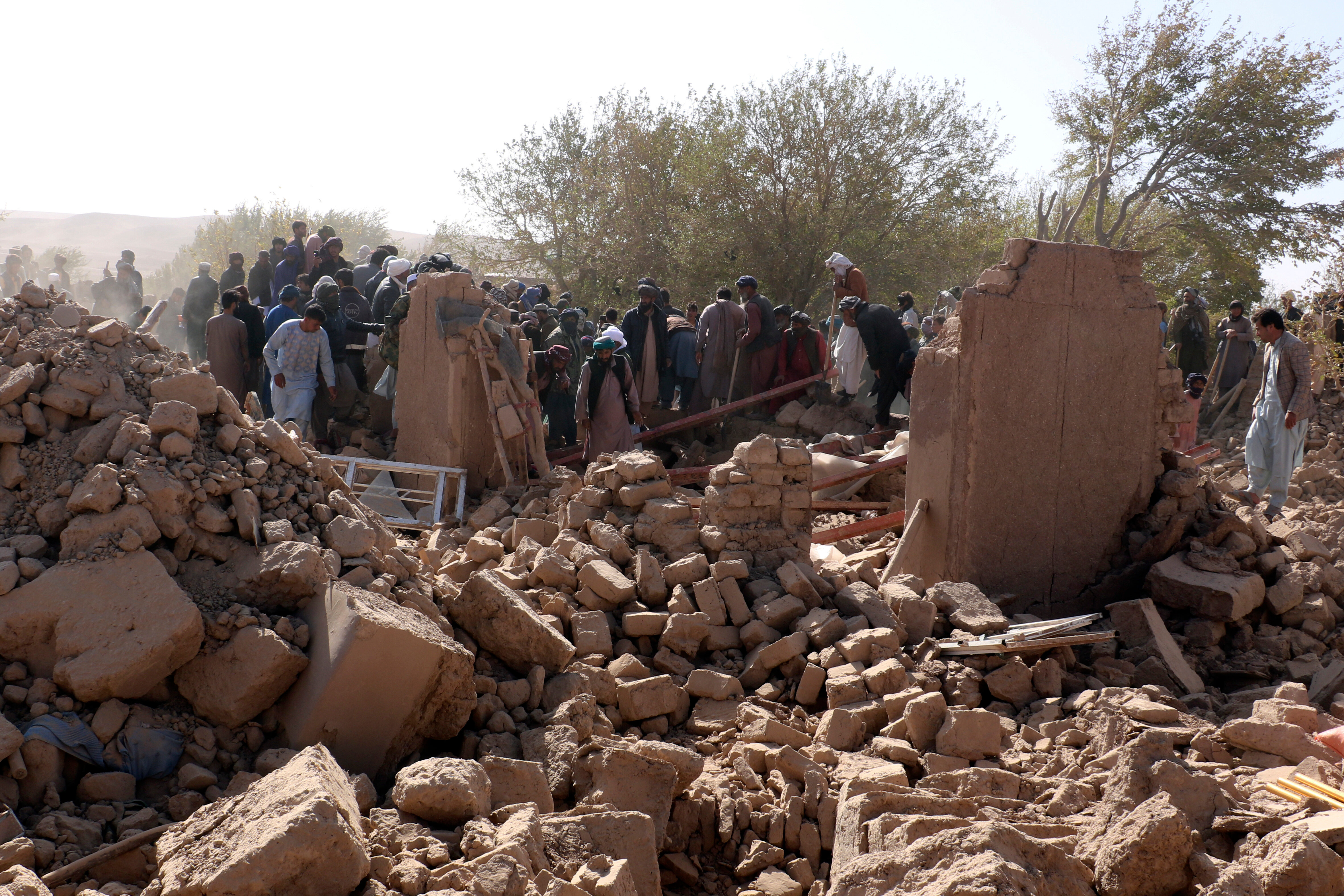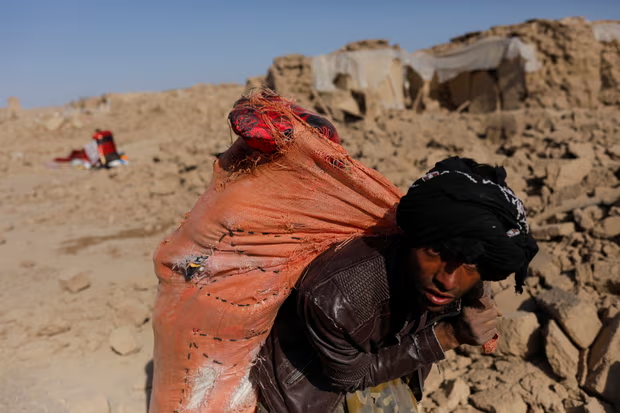Another Powerful Earthquake Strikes Western Afghanistan
Another powerful earthquake strikes Western Afghanistan with magnitude of 6.3 that struck the region, adding to the devastation caused by a series of recent quakes.
Author:Suleman ShahReviewer:Han JuOct 11, 20236.7K Shares449.7K Views

Another powerful earthquake strikes Western Afghanistanwith magnitude of 6.3 that struck the region, adding to the devastation caused by a series of recent quakes.
This natural disaster has left thousands of people in turmoil, resulting in loss of lives, injuries, and widespread destruction.
The New Earthquake
Early on Wednesday morning, a 6.3 magnitude earthquake struck an area located 28 kilometers (17 miles) south of Herat's regional capital.
The seismic event occurred at 5:11 am local time, further compounding the challenges faced by the region.
The latest earthquake claimed one lifeand left at least 150 people injured. Herat's regional hospital, already strained by the previous quakes, reported a continuous influx of injured individuals.
The hospital, with a capacity of 600 beds, reached full capacity on Saturday afternoon due to the earlier quakes.
Several aftershocks were felt in Herat city, keeping residents on edge. Medics at the regional hospital noted that "injured people keep arriving," as the situation continues to evolve.

Devastation And Disruption
The office of Herat's governor reported that areas previously affected by the earthquakes had suffered "huge losses."
These losses include the leveling of villages and the collapse of over 400 houses in a single village. As a result, basic necessities such as electricity and clean drinking water have become scarce.
The disruption in Herat has led to a situation where access to food is limited, with many shops either closing or being destroyed. Residents have been grappling with the challenges of daily life as the earthquakes persist.
With the ongoing seismic activity, hundreds of residents have chosen to evacuate the city.
The roads leading to a nearby desert have become congested with cars and people seeking safety in case of another earthquake. Fears of further casualties and collapsed structures have prompted this mass exodus.
International Aid And The Taliban's Response
Relief and rescue efforts have been hindered by a shortage of international aid, which had previously been a significant part of the region's economy but has dwindled since the Taliban took control in 2021.
The Taliban's inexperience in managing natural disasters has created additional challenges in conducting search and rescue operations.
Members of the Taliban's rescue teams, seen in social media and state TV footage, are depicted extracting bricks from pilesof rubble while carrying firearms.
This unfamiliarity with disaster management adds complexity to the crisis.
Calls For Global Support
The International Federation of Red Cross and Red Crescent Societies (IFRC) has urged world leaders not to forget Afghanistan in this time of crisis.
The United Nations has approved $5 million in aid, and the European Union has pledged €3.5 million.
Several countries, including Pakistan, Iran, Turkey, and China, have committed to sending humanitarian aid and financial assistance.
However, on the ground in Herat province, there is frustration among Taliban officials with the pace and impact of the international aid efforts.
Herat's police commander, Abdullah Ensaf, expressed the urgency of the situation, emphasizing that "people need aid urgently."
Yama Farzan, an economic recovery officer at the Danish Refugee Council, highlighted the ongoing challenges.
“„It will take weeks to supply shelter to those affected. Many still lack tents and are sleeping amid the rubble of their destroyed homes.- Yama Farzan, an economic recovery officer at the Danish Refugee Council
As Western Afghanistan grapples with the aftermath of these powerful earthquakes, it is a stark reminder of the resilience of the Afghan people, who now rely on international support to overcome this dire situation.
Final Words
In the wake of multiple powerful earthquakes that have struck Western Afghanistan, the region faces an escalating humanitarian crisis.
The recent 6.3 magnitude earthquake has further compounded the devastation caused by previous seismic events, resulting in loss of life, injuries, and widespread destruction.
As the people of Herat struggle to cope with the immediate aftermath, international aid is critical to providing relief and support for those affected.
However, the response has been hampered by challenges, including the inexperience of local authorities in managing natural disasters.
With ongoing seismic activity and a shortage of vital resources, the situation remains dire. It is a poignant reminder of the resilience of the Afghan people and the need for prompt and effective international assistance in this time of crisis.

Suleman Shah
Author
Suleman Shah is a researcher and freelance writer. As a researcher, he has worked with MNS University of Agriculture, Multan (Pakistan) and Texas A & M University (USA). He regularly writes science articles and blogs for science news website immersse.com and open access publishers OA Publishing London and Scientific Times. He loves to keep himself updated on scientific developments and convert these developments into everyday language to update the readers about the developments in the scientific era. His primary research focus is Plant sciences, and he contributed to this field by publishing his research in scientific journals and presenting his work at many Conferences.
Shah graduated from the University of Agriculture Faisalabad (Pakistan) and started his professional carrier with Jaffer Agro Services and later with the Agriculture Department of the Government of Pakistan. His research interest compelled and attracted him to proceed with his carrier in Plant sciences research. So, he started his Ph.D. in Soil Science at MNS University of Agriculture Multan (Pakistan). Later, he started working as a visiting scholar with Texas A&M University (USA).
Shah’s experience with big Open Excess publishers like Springers, Frontiers, MDPI, etc., testified to his belief in Open Access as a barrier-removing mechanism between researchers and the readers of their research. Shah believes that Open Access is revolutionizing the publication process and benefitting research in all fields.

Han Ju
Reviewer
Hello! I'm Han Ju, the heart behind World Wide Journals. My life is a unique tapestry woven from the threads of news, spirituality, and science, enriched by melodies from my guitar. Raised amidst tales of the ancient and the arcane, I developed a keen eye for the stories that truly matter. Through my work, I seek to bridge the seen with the unseen, marrying the rigor of science with the depth of spirituality.
Each article at World Wide Journals is a piece of this ongoing quest, blending analysis with personal reflection. Whether exploring quantum frontiers or strumming chords under the stars, my aim is to inspire and provoke thought, inviting you into a world where every discovery is a note in the grand symphony of existence.
Welcome aboard this journey of insight and exploration, where curiosity leads and music guides.
Latest Articles
Popular Articles